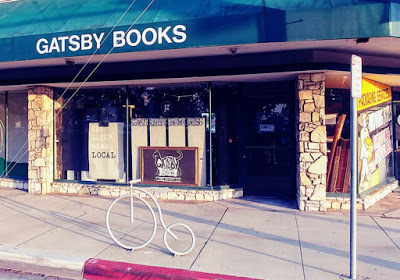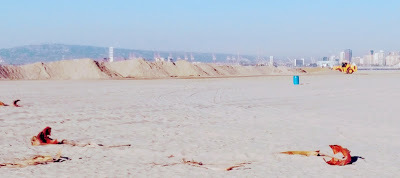R.L. Swihart's Blog, page 123
November 25, 2018
From Tolstoy's "Kreutzer"
Two bits:
"So we lived in the city. In the city the wretched feel less sad. One can live there a hundred years without being noticed, and be dead a long time before anybody will notice it. People have no time to inquire into your life. All are absorbed. Business, social relations, art, the health of children, their education. And there are visits that must be received and made; it is necessary to see this one, it is necessary to hear that one or the other one. In the city there are always one, two, or three celebrities that it is indispensable that one should visit."
***
"Thus we passed two years more. The method prescribed by the rascals had evidently succeeded. My wife had grown stouter and handsomer. It was the beauty of the end of summer. She felt it, and paid much attention to her person. She had acquired that provoking beauty that stirs men. She was in all the brilliancy of the wife of thirty years, who conceives no children, eats heartily, and is excited. The very sight of her was enough to frighten one. She was like a spirited carriage-horse that has long been idle, and suddenly finds itself without a bridle. As for my wife, she had no bridle, as for that matter, ninety-nine hundredths of our women have none."
Published on November 25, 2018 15:31
Walking in Naples [11/25/18]
Published on November 25, 2018 15:28
November 24, 2018
Rereading Tolstoy's "Kreutzer Sonata"
Think whatever you like of Tolstoy. Late Tolstoy: old crank, crackpot, seer? A little bit of everything, like all of us. Still, one thing he saw clearly: we are a mess.
I was having a hard time "settling in" to the next read: then I landed in Tolstoy's Kreutzer Sonata. Though a bit dated -- what would he have turned his attention to now? -- much of it still rings true.
I fall for almost anything beginning or ending with a train.:)
*
Two bits:
***
I was having a hard time "settling in" to the next read: then I landed in Tolstoy's Kreutzer Sonata. Though a bit dated -- what would he have turned his attention to now? -- much of it still rings true.
I fall for almost anything beginning or ending with a train.:)
*
Two bits:
"Well, I am going then to tell you my life, and my whole frightful history,--yes, frightful. And the story itself is more frightful than the outcome." He became silent for a moment, passed his hands over his eyes, and began:-- "To be understood clearly, the whole must be told from the beginning. It must be told how and why I married, and what I was before my marriage. First, I will tell you who I am. The son of a rich gentleman of the steppes, an old marshal of the nobility, I was a University pupil, a graduate of the law school. I married in my thirtieth year. But before talking to you of my marriage, I must tell you how I lived formerly, and what ideas I had of conjugal life. I led the life of so many other so-called respectable people,--that is, in debauchery. And like the majority, while leading the life of a debauche, I was convinced that I was a man of irreproachable morality."
***
"I looked at her. Her whole face expressed hatred, and hatred of me. I cannot describe to you the fright which this sight gave me. 'How? What?' thought I, 'love is the unity of souls, and here she hates me? Me? Why? But it is impossible! It is no longer she!' "I tried to calm her. I came in conflict with an immovable and cold hostility, so that, having no time to reflect, I was seized with keen irritation. We exchanged disagreeable remarks. The impression of this first quarrel was terrible. I say quarrel, but the term is inexact. It was the sudden discovery of the abyss that had been dug between us. Love was exhausted with the satisfaction of sensuality. We stood face to face in our true light, like two egoists trying to procure the greatest possible enjoyment, like two individuals trying to mutually exploit each other."
Published on November 24, 2018 09:35
Xmas Tree Lighting @ Colorado Lagoon [11/23/18]
Got the time from a friend: 6 to 8. We were watching a so-so film with Rooney Mara (had to finish) and thought: they'll light it up toward the end. We left near 7 and the lights were already on. Walked to the bridge, squeezed through all the kids and Santa-searchers (he himself was lost in the crowd) and took Charlie over the bridge (one of his favorite pastimes). I took some pics (two turned out OK), we heard some canned Xmas carols coming from the lifeguard hut (I think I heard Mahalia), walked home.
*


Published on November 24, 2018 09:22
November 23, 2018
T-Day: Walking after the Rain
Published on November 23, 2018 10:07
November 21, 2018
Gatsby is a Cat
Most bookstores have gone the way of just about everything else: Poof! Who still remembers Dodd's. Anyway, I'll confess: I eventually started cozying up with my Kindle. Easier. Cheaper.
Anyway, brave souls. There's something to be said for community, finding a hard-to-get gem on the musty shelves, holding a real book in your hands.
*



Anyway, brave souls. There's something to be said for community, finding a hard-to-get gem on the musty shelves, holding a real book in your hands.
*



Published on November 21, 2018 12:03
November 20, 2018
The Lord Chandos Letter
A Letter ( Ein Brief ), usually known as The Letter of Lord Chandos or the Chandos Letter , is a prose work written by Hugo von Hofmannsthal in 1902. It is in the form of a letter dated August 1603 from a writer named Lord Philip Chandos (a fictional character) to Francis Bacon, and describes Chandos's crisis of language.
Plot Summary
The letter begins with a summary of the great literary feats that Chandos once achieved. Then Chandos writes of his current mental state. He has reached a crisis point in his career concerning language and its ability to adequately express the human experience. Chandos has abandoned all future written projects, which he once proposed with exuberance, because of his inability to express himself in a meaningful fashion. Chandos describes the development of his crisis in stages. First came the loss of the ability to conduct academic discourse on matters of morality or philosophy. Next, he lost the function to make everyday conversation regarding opinions or judgments. Lastly he turned to the classics, works by Cicero and Seneca, in an attempt to cure his literary ailment but could make no sense of them and his condition continued to decline. Chandos describes his state at present as, “…[having] lost completely the ability to think or speak of anything coherently.”[1] Chandos experiences extreme moments of transcendence, where epiphanies on life and the spirit overwhelm him. However, these moments are brief in nature and once they have passed Chandos is incapable of expressing the insight he uncovered moments before. These epiphanies are the highlight of Chandos’ existence, and outside of them his life is stagnant and barren. Chandos often feels he is on the brink of recovery as thoughts begin to form in his mind. But like the epiphanies they are soon lost in his inability to write. This failure of language has robbed him of self-confidence and creativity. The end result is Chandos as a broken man mourning his lost abilities. Chandos ultimately says he will write no more in any known language.
[Wikipedia: https://en.wikipedia.org/wiki/The_Lor...]
Published on November 20, 2018 09:50
Another Detour: The Lord Chandos Letter (Ein Brief)
So many great "bits" that the whole letter should be inserted here. I'll resist (plus the sharing app is giving me a problem). This is only the last few paragraphs and "sign off" (unformatted).
*
You were kind enough to express your regret that no more books by me have been arriving “to make up for the loss of our companionship.” When I read that, I knew—not without a pang—that I would write no books either in English or in Latin in the coming year, the years after that, or in all the years of this life of mine. There is only one reason for this, a strange and embarrassing one; I leave it to your infinite intellectual superiority to give it a place among what to your clear eyes is an orderly array of mental and physical phenomena. It is that the language in which I might have been granted the opportunity not only to write but also to think is not Latin or English, or Italian, or Spanish, but a language of which I know not one word, a language in which mute things speak to me and in which I will perhaps have something to say for myself someday when I am dead and standing before an unknown judge. I had wanted, had it only been permitted me, to squeeze into the closing words of this, the last letter I expect I will write to Francis Bacon, all the love and gratitude, all the boundless admiration which I bear in my heart for the one who has done the most for my spirit—the foremost Englishman of my time—and which I will continue to bear in my heart until death bursts it. August 22, AD 1603 Phi. Chandos (1902)
Published on November 20, 2018 09:44
November 18, 2018
Colorado Lagoon + Floating Xmas Trees + The Usual Suspects
Published on November 18, 2018 12:26
November 12, 2018
The Weekend (11/10 to 11/12)
Published on November 12, 2018 09:25































